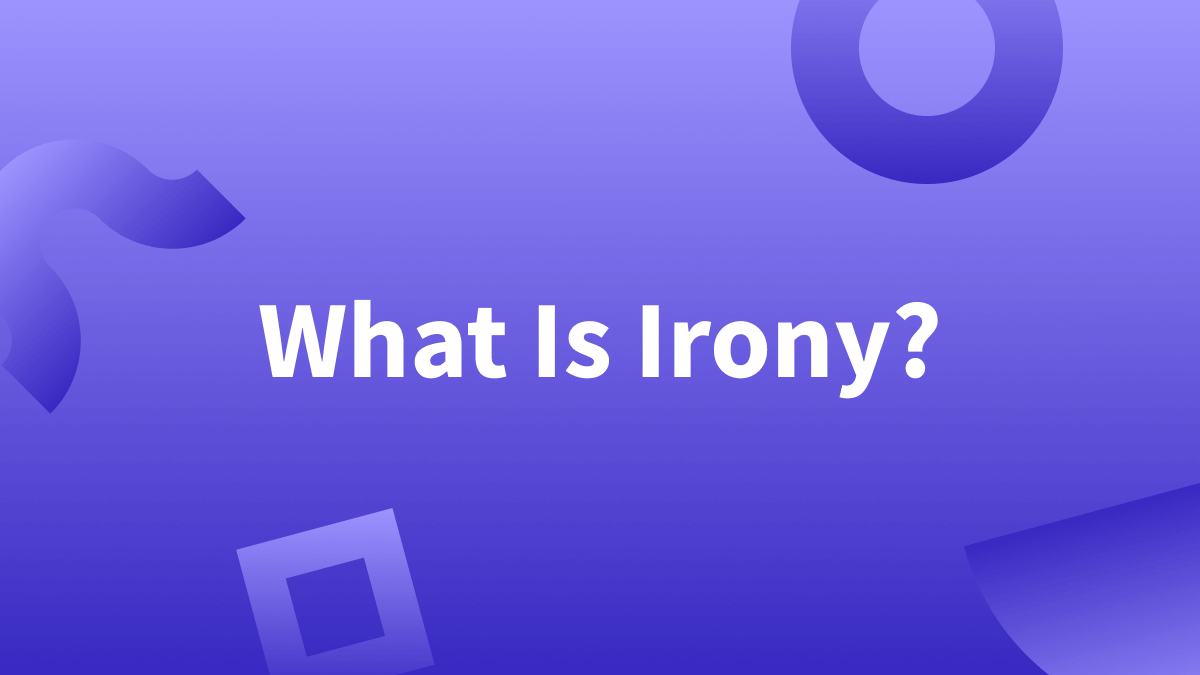Quick Summary on “Irony”
- Irony is a rhetorical device in which a statement or situation contrasts with what is expected or known.
- There are a few different types of irony, including verbal irony, situational irony, and dramatic irony.
- An example of verbal irony would be:
- ○ This frigid, gloomy weather is perfect to go tanning.
Understanding Irony
Chances are you’ve labeled something as ironic at some point or another. But did you use the word ironic correctly? It’s a word that is frequently misunderstood and therefore used incorrectly. After reading this blog post, you’ll understand exactly what is—or isn’t—ironic.
What Does “Irony” Mean?
Irony is a rhetorical device and literary technique that is incredibly useful when used correctly. Simply put, irony is when something that is said or done is in contrast to reality or to what is expected. There are several different types of irony, the most prominent being verbal irony, situational irony, and dramatic irony. We’ll elaborate on what these mean and provide examples below.
What Does “Verbal Irony” Mean?
Verbal irony is when the actual meaning of what someone says is opposite to what they actually mean. Examples of verbal irony can be found throughout literary works. One famous example would be from George Orwell’s book, “Animal Farm.”
All animals are equal but some animals are more equal than others.
This is a perfect example of verbal irony because although the first part of the statement reads that all animals are “equal,” the second part of the statement indicates that in actuality, some animals are more favored than others.
Overstatements and understatements are also types of verbal ironies. Overstatements dramatize something small, and understatements underplay something big.
For example, if you get a paper cut, saying “there’s nothing that hurts more than a paper cut,” can be considered an overstatement. On the opposite side of the spectrum, if you’re on a safari and come across a lion, saying something like “that’s a cute kitty,” is an example of an understatement.
Verbal Irony vs. Sarcasm
At face value, verbal irony seems to be synonymous with sarcasm, but don’t be mistaken; it’s not. Although sarcasm is a form of verbal irony, not all verbally ironic statements are sarcastic. The biggest difference between the two? Sarcasm is usually directed toward a person with the intent to criticize or mock.
What Does “Situational Irony” Mean?
Situational irony (also known as irony of events) refers to an outcome that is different from what is expected. If a fire station burns down, that would be ironic because you would expect that they have all the necessary knowledge and equipment to stop that from happening.
An example of situational irony can be found in the short story “The Gift of Magi” by O. Henry. The story tells of a husband and wife who make sacrifices to buy each other Christmas gifts. The wife cuts and sells her long hair to buy her husband a chain for his watch, while the husband sells his watch to buy her ornamental combs for her hair. What’s ironic about that situation is that although big sacrifices were made, both unexpectedly end up with useless gifts.
What Does “Dramatic Irony” Mean?
Imagine watching a scary movie in which you know that the killer is hiding in the closet. Then the victim, trying to escape a horrific outcome, hides precisely in the same closet the killer is in. This is dramatic irony—when the audience knows something integral that the characters in the story, play, or movie do not.
Perhaps you’re familiar with the movie “The Truman Show.” In this movie, the audience (and everyone else in the film) knows that the main character (Jim Carrey) is part of a show. However, he is the only one unaware of this fact, and realizes it only at the end of the movie.
Isn’t It Ironic?
Irony is an incredibly useful literary device that can add different types of effects to your writing. It can bring comedic relief or unexpected tragedy, depending on how you use it. In any case, irony sheds light on the truth without explicitly stating it.
Remember: Irony is when a statement or situation differs to what is the truth or expected.
We’ll leave you with one last example of irony: A proofreader turns in a text that is riddled with spelling and grammar mistakes.
This is ironic because a proofreader is a professional that gets paid precisely to remove spelling and grammar errors. What the proofreader should have done to avoid such an ironic situation is use LanguageTool—a multilingual spelling and grammar checker that can correct all types of mistakes, ensuring proofreaders all over the world keep their job.

